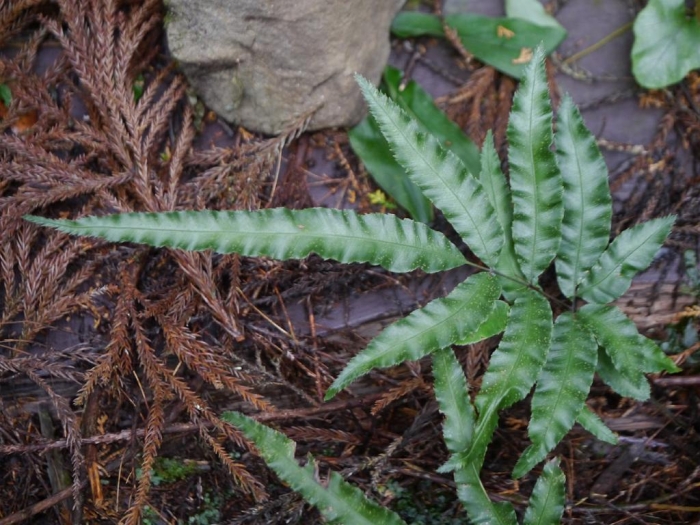Silver Ribbon Fern
(Pteris parkeri)
Silver Ribbon Fern (Pteris parkeri)
/
/

Keisotyo
CC BY-SA 4.0
Image By:
Keisotyo
Recorded By:
Copyright:
CC BY-SA 4.0
Copyright Notice:
Photo by: Keisotyo | License Type: CC BY-SA 4.0 | License URL: https://creativecommons.org/licenses/by-sa/4.0 | Uploader: Keisotyo | Publisher: Wikimedia Commons | Title: Pteris_nipponica_matuzakasd33.jpg | Notes: |
























Estimated Native Range
Summary
Pteris parkeri, commonly known as Silver Ribbon Fern, is an evergreen fern native to the understory of temperate forests in East Asia, including regions of Taiwan and Japan. This fern typically grows to a height of 2 feet (0.6 meters) and a width of 1 foot (0.3 meters), featuring arching fronds with a silvery sheen that gives it its common name. The fronds are compound with narrow, ribbon-like segments, adding a delicate texture to the plant’s appearance. Silver Ribbon Fern does not produce flowers, but its fronds are highly ornamental, making it a favored choice for shaded garden areas and indoor plant collections.
Silver Ribbon Fern is valued for its ease of maintenance and its ability to thrive in low-light conditions, making it suitable for indoor environments or shaded outdoor spaces. It is often used as an accent plant in woodland gardens, shaded borders, or as a ground cover under larger shrubs and trees. While it prefers consistently moist, well-draining soil, it is relatively tolerant of short dry periods once established. Gardeners should ensure that the soil does not become waterlogged, as this can lead to root rot. It is not known for having significant disease or pest problems, but it can be sensitive to overly bright light and dry air.CC BY-SA 4.0
Silver Ribbon Fern is valued for its ease of maintenance and its ability to thrive in low-light conditions, making it suitable for indoor environments or shaded outdoor spaces. It is often used as an accent plant in woodland gardens, shaded borders, or as a ground cover under larger shrubs and trees. While it prefers consistently moist, well-draining soil, it is relatively tolerant of short dry periods once established. Gardeners should ensure that the soil does not become waterlogged, as this can lead to root rot. It is not known for having significant disease or pest problems, but it can be sensitive to overly bright light and dry air.CC BY-SA 4.0
Plant Description
- Plant Type: Fern
- Height: 1-2 feet
- Width: 1-1.3 feet
- Growth Rate: Moderate
- Flower Color: N/A
- Flowering Season: Non-Flowering
- Leaf Retention: Evergreen
Growth Requirements
- Sun: Part Shade, Full Shade
- Water: Medium
- Drainage: Medium
Common Uses
Deer Resistant, Low Maintenance, Potted Plant
Natural Habitat
native to the understory of temperate forests in East Asia, including regions of Taiwan and Japan
Other Names
Common Names: White-Lined Cretan Brake
Scientific Names: , Pteris parkeri, Pteris cretica var. albolineata, Pteris nipponica, Pteris cretica subsp. nipponica,
GBIF Accepted Name: Pteris parkeri J.J.Parker